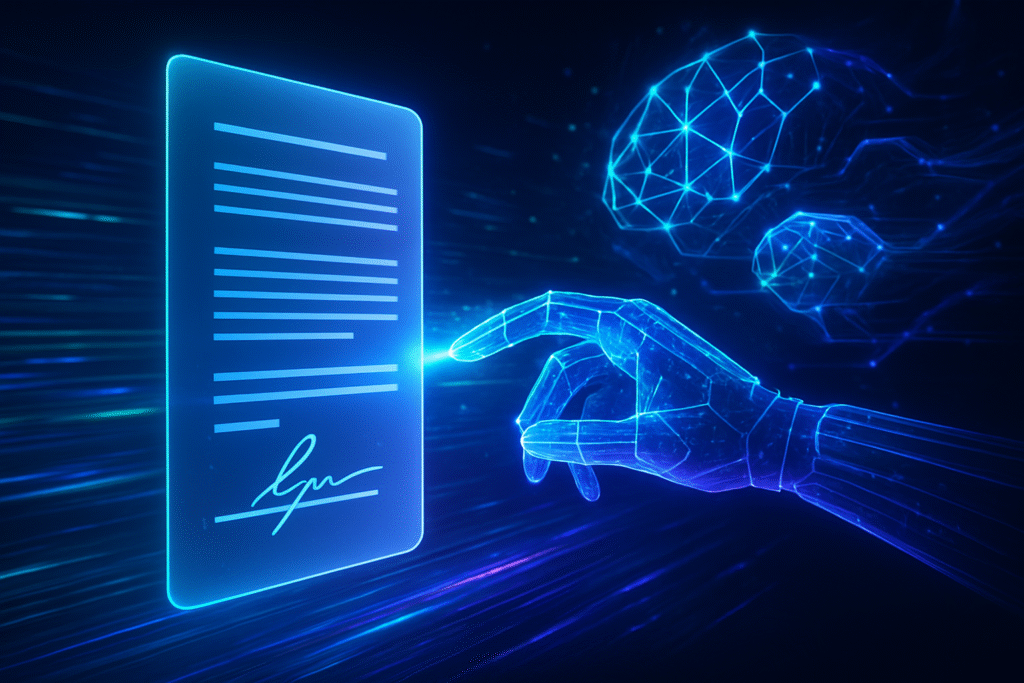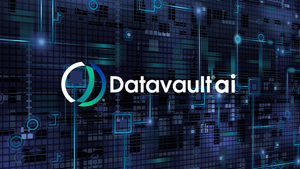
The landscape of agreement management, long dominated by established players like DocuSign (NASDAQ: DOCU), is undergoing a profound transformation. A new wave of artificial intelligence-powered solutions, exemplified by OpenAI's internal "DocuGPT," is challenging the status quo, promising unprecedented efficiency and accuracy in contract handling. This shift marks a pivotal moment, forcing incumbents to rapidly innovate or risk being outmaneuvered by AI-native competitors.
OpenAI's DocuGPT, initially developed for its internal finance teams, represents a significant leap in AI's application to complex document workflows. This specialized AI agent is engineered to convert unstructured contract files—ranging from PDFs to scanned documents and even handwritten notes—into clean, searchable, and structured data. Its emergence signals a strategic move by OpenAI beyond foundational large language models into specialized enterprise software, directly targeting the lucrative contract lifecycle management (CLM) market.
The Technical Edge: How AI Redefines Contract Intelligence
At its core, DocuGPT functions as an intelligent contract parser and analyzer. It leverages retrieval-augmented prompting, a sophisticated AI technique that allows the model to not only understand contract language but also to reference external knowledge bases (like ASC 606 for accounting standards) to identify non-standard terms and provide contextual reasoning. This capability goes far beyond simple keyword extraction, enabling deep semantic understanding of legal documents.
The system's technical prowess manifests in several key areas. It can ingest a wide array of document formats, meticulously extracting key details, terms, and clauses. OpenAI has reported that DocuGPT has internally slashed contract review times by over 50%, allowing their teams to process hundreds or thousands of contracts without a proportional increase in human resources. Furthermore, the tool enhances accuracy and consistency by highlighting unusual terms and providing annotations, with each cycle of human feedback further refining its precision. The output is structured, queryable data, making complex contract portfolios easily analyzable. This fundamentally differs from traditional e-signature platforms, which primarily focus on the execution and storage of contracts, offering limited intelligent analysis of their content.
Beyond its internal tools, OpenAI's broader influence in legal tech is undeniable. Its advanced models, GPT-3.5 Turbo and GPT-4, are the backbone for numerous legal AI applications. Partnerships with companies like Harvey, a generative AI platform for legal professionals, and Ironclad, which uses GPT-4 for its AI Assist to automate legal review and redlining, demonstrate the widespread adoption of OpenAI's technology to augment human legal expertise. These integrations are transforming tasks like document drafting, complex litigation support, and identifying contract discrepancies, moving beyond mere digital signing to intelligent content management.
to automate legal review and redlining, demonstrate the widespread adoption of OpenAI's technology to augment human legal expertise. These integrations are transforming tasks like document drafting, complex litigation support, and identifying contract discrepancies, moving beyond mere digital signing to intelligent content management.
Competitive Currents: Reshaping the Legal Tech Landscape
The rise of AI-powered contract management solutions carries significant competitive implications. Companies that embrace these advanced tools stand to benefit immensely from increased operational efficiency, reduced costs, and accelerated deal cycles. For DocuSign (NASDAQ: DOCU), a company synonymous with electronic signatures and document workflow, this represents both a formidable challenge and a pressing opportunity. Its trusted brand and vast user base are assets, but the core value proposition is shifting from secure signing to intelligent contract understanding and automation.
Established legal tech players and tech giants are now in a race to integrate or develop superior AI capabilities. DocuSign, with its deep market penetration, must rapidly evolve its offerings to include more sophisticated AI-driven analysis, negotiation, and lifecycle management features to remain competitive. The risk for DocuSign is that its current offerings, while robust for e-signatures, may be perceived as less comprehensive compared to AI-first platforms that can proactively manage contract content.
Meanwhile, startups and innovative legal tech firms leveraging OpenAI's APIs and other generative AI models are poised to disrupt the market. These agile players can build specialized solutions that offer deep contract intelligence from the ground up, potentially capturing market share from traditional providers. The market is increasingly valuing AI-driven insights and automation over mere digitization, creating a new battleground for strategic advantage.
A Broader AI Tapestry: Legal Transformation and Ethical Imperatives
This development is not an isolated incident but rather a significant thread in the broader tapestry of AI's integration into professional services. Generative AI is rapidly transforming the legal landscape, moving from assisting with research to actively participating in contract drafting, review, and negotiation. It signifies a maturation of AI from niche applications to core business functions, impacting how legal departments and businesses operate globally.
The impacts are wide-ranging: legal professionals can offload tedious, repetitive tasks, allowing them to focus on high-value strategic work. Businesses can accelerate their contract processes, reducing legal bottlenecks and speeding up revenue generation. Compliance becomes more robust with AI's ability to quickly identify and flag deviations from standard terms. However, this transformation also brings potential concerns. The accuracy and potential biases of AI models, data security of sensitive legal documents, and the ethical implications of AI-driven legal advice are paramount considerations. Robust validation, secure data handling, and transparent AI governance frameworks are critical to ensuring responsible adoption. This era is reminiscent of the initial digital transformation that brought e-signatures to prominence, but with AI, the shift is not just about digitizing processes but intelligently automating and enhancing them.
The Horizon: Autonomous Contracts and Adaptive AI
Looking ahead, the evolution of AI in contract management promises even more transformative developments. Near-term advancements will likely focus on refining AI's ability to not only analyze but also to generate and negotiate contracts with increasing autonomy. We can expect more sophisticated predictive analytics, where AI identifies potential risks or opportunities within contract portfolios before they materialize. The integration of AI with blockchain for immutable contract records and smart contracts could further revolutionize the field.
On the horizon are applications that envision fully autonomous contract lifecycle management, where AI assists from initial drafting and negotiation through execution, compliance monitoring, and renewal. This could include AI agents capable of understanding complex legal precedents, adapting to new regulatory environments, and even engaging in limited negotiation with human oversight. Challenges remain, including the development of comprehensive regulatory frameworks for AI in legal contexts, ensuring data privacy and security, and overcoming resistance to adoption within traditionally conservative industries. Experts predict a future where human legal professionals work in symbiotic partnership with advanced AI systems, leveraging their strengths to achieve unparalleled efficiency and insight.
The Dawn of Intelligent Agreements: A New Era for DocuSign and Beyond
The emergence of AI rivals like OpenAI's DocuGPT signals a definitive turning point in the agreement management sector. The era of merely digitizing signatures and documents is giving way to one defined by intelligent automation and deep contextual understanding of contract content. For DocuSign (NASDAQ: DOCU), the key takeaway is clear: its venerable brand and market leadership must now be complemented by aggressive AI integration and innovation across its entire product suite.
This development is not merely an incremental improvement but a fundamental reshaping of how businesses and legal professionals interact with contracts. It marks a significant chapter in AI history, demonstrating its capacity to move beyond general-purpose tasks into highly specialized and impactful enterprise applications. The long-term impact will be profound, leading to greater efficiency, reduced operational costs, and potentially more equitable and transparent legal processes globally. In the coming weeks and months, all eyes will be on DocuSign's strategic response, the emergence of new AI-native competitors, and the continued refinement of regulatory guidelines that will shape this exciting new frontier.
This content is intended for informational purposes only and represents analysis of current AI developments.
TokenRing AI delivers enterprise-grade solutions for multi-agent AI workflow orchestration, AI-powered development tools, and seamless remote collaboration platforms.
For more information, visit https://www.tokenring.ai/.






